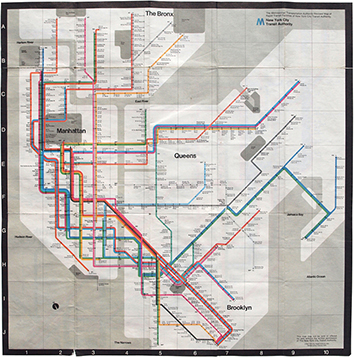Working memory and background knowledge - Cognitive science in the design classroom
DOI:
https://doi.org/10.7577/formakademisk.1423Keywords:
working memory, context, background knowledge, visual narrative, teachingAbstract
This article discusses two universal principles from cognitive psychology, and proposes some ways in which those principles relate to graphic design. The two most important principles are first, the strict constraints of working memory, a function which persists for only a few seconds, and second, the finding that perceptions and meanings are mediated by the cultural knowledge of viewers, including their knowledge of design conventions and genre. Better de-signs are likely to emerge from the designer’s familiarity with these psychological and cultur-al principles. Visual examples, including maps and student projects, illustrate how the two principles are useful for classroom instruction.
Downloads
Published
2015-07-13
How to Cite
Trogu, P. (2015). Working memory and background knowledge - Cognitive science in the design classroom. FormAkademisk, 8(1). https://doi.org/10.7577/formakademisk.1423
Issue
Section
Articles
License
Authors who publish with this journal agree to the following terms:
- Authors retain copyright and grant the journal right of first publication with the work simultaneously licensed under a Creative Commons Attribution 4.0 License that allows others to share the work with an acknowledgement of the work's authorship and initial publication in this journal.
- Authors are able to enter into separate, additional contractual arrangements for the non-exclusive distribution of the journal's published version of the work (e.g., post it to an institutional repository or publish it in a book), with an acknowledgement of its initial publication in this journal.
- Authors are permitted and encouraged to post their work online (e.g., in institutional repositories or on their website) prior to and during the submission process, as it can lead to productive exchanges, as well as earlier and greater citation of published work (See The Effect of Open Access).
- The author(s) must manage their economic reproduction rights to any third party.
- The journal makes no financial or other compensation for submissions, unless a separate agreement regarding this matter has been made with the author(s).
- The journal is obliged to archive the manuscript (including metadata) in its originally published digital form for at least a suitable amount of time in which the manuscript can be accessed via a long-term archive for digital material, such as in the Norwegian universities’ institutional archives within the framework of the NORA partnership.
The material will be published OpenAccess with a Creative Commons 4.0 License which allows anyone to read, share and adapt the content, even commercially under the licence terms:
This work needs to be appropriately attributed/credited, a link must be provided to the CC-BY 4.0 licence, and changes made need to be indicated in a reasonable manner, but not in any way that suggests that the licensor endorses you or your use.



